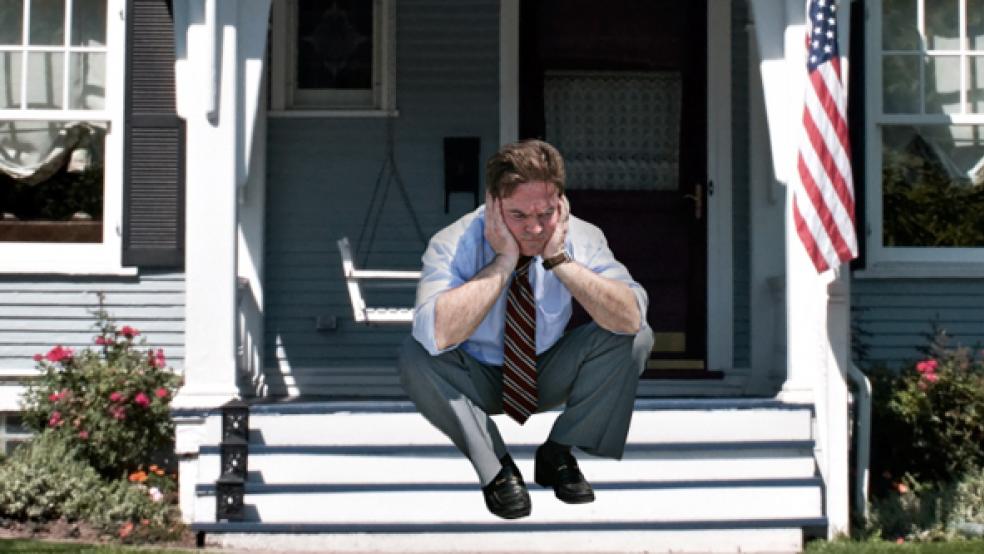In the latest sign of a weak economy, home prices in March fell to their lowest point since the housing collapse began. Prices are now back to mid-2002 levels as the housing market remains bogged down by an oversupply of inventory and an undersupply of buyers and may not have hit bottom.
Home prices fell 4.2 percent in the first quarter of 2011, the eighth consecutive quarterly drop, according to the Standard & Poor’s/Case-Shiller National Home Price Index, putting the index 5.1 percent below the first quarter of 2010. “This month’s report is marked by the confirmation of a double-dip in home prices across much of the nation,” David Blitzer, Chairman of the Index Committee at S&P indices said in a statement. “Home prices continue on their downward spiral with no relief in sight.”
Consumer confidence also declined, according to a separate report.
Home prices are now 33 percent below their 2006 peak and have fallen by more than the 31 percent decline that took place during the Great Depression. “The current housing crash will further eclipse the one seen during the Great Depression, if not in duration, certainly in size,” said Paul Dales, economist with Capital Economics. He warned that when home prices fell during the Great Depression, it took 19 years for the market to regain its value.
Even more troubling, the bottom has yet to be reached Dales said. Some experts say that home prices will fall another five to 10 percent this year and may bottom out in 2012 at the earliest. Earlier this month, the National Association of Realtors said the pending home sales index, which tracks contracts signed in April, fell by 11.6 percent from March.
“People don’t want to buy homes if house prices are going to fall further,” said Karen Dynan, economist with Brookings Institution. “There can be a negative self reinforcing cycle—house prices are falling because demand is soft, people expect house prices to fall further so they become more reluctant to buy homes and house prices fall further.” Dynan said she can’t predict when the housing market will hit bottom.
Prices plunged in 19 metro areas tracked by the S&P/Case Shiller Index of 20 metro areas compared with last year. Minneapolis posted a 10 percent decline from a year earlier. Washington, D.C. was the only city to show an annual gain.
Twelve cities hit their lowest levels in nearly four years: Atlanta, Charlotte, Chicago, Cleveland, Detroit, Las Vegas, Miami, Minneapolis, New York, Phoenix, Portland, Ore., and Tampa. The 20-city composite posted an annual rate of decline of 3.6 percent, while prices fell 2.9 percent in the 10-city composite.
A record number of foreclosure sales are forcing home prices down. Sales of bank-owned homes and those in some stage of foreclosure accounted for 28 percent of all residential sales in the first quarter of 2011, according to RealtyTrac, the largest online market for foreclosed properties. High unemployment also has cut into home sales.
But not all housing experts are pessimistic. “The housing market is at a turning point as conditions are beginning to look up,” said Mike Zoller, economist with Moody’s Analytics. “Though job creation--one of housing demand's key drivers--had been proceeding at glacial pace, the rate of growth is picking up. With hours worked rising and corporate profitability surging, hiring will step up further. This will boost confidence and incomes, fostering growth in the housing market.”
Meanwhile, in a separate report Tuesday, the Conference Board reported that consumer confidence fell steeply in May to a six month low and now stands at 60.8 (on a scale of 100), down from 66 in April.
“Consumers are considerably more apprehensive about future business and labor market conditions as well as their income prospects. Inflation concerns, which had eased last month, have picked up once again,” said Lynn Franco, director of the Conference Board Consumer Research Center in a statement.
The reports come days before the Labor Dept.’s May employment report on Friday. Experts predict the number of new jobs will well below April’s surprisingly strong 244,000 increase. The consensus is for May’s numbers to be around 175,000 new jobs created.
Related Links:
Home Prices Still Falling (Wall Street Journal)
S&P/Case Shiller Signals Double Dip in Housing Economic Report (MarketWatch)
Five Questions on Tuesday’s S&P/Case Shiller (Wall Street Journal)





